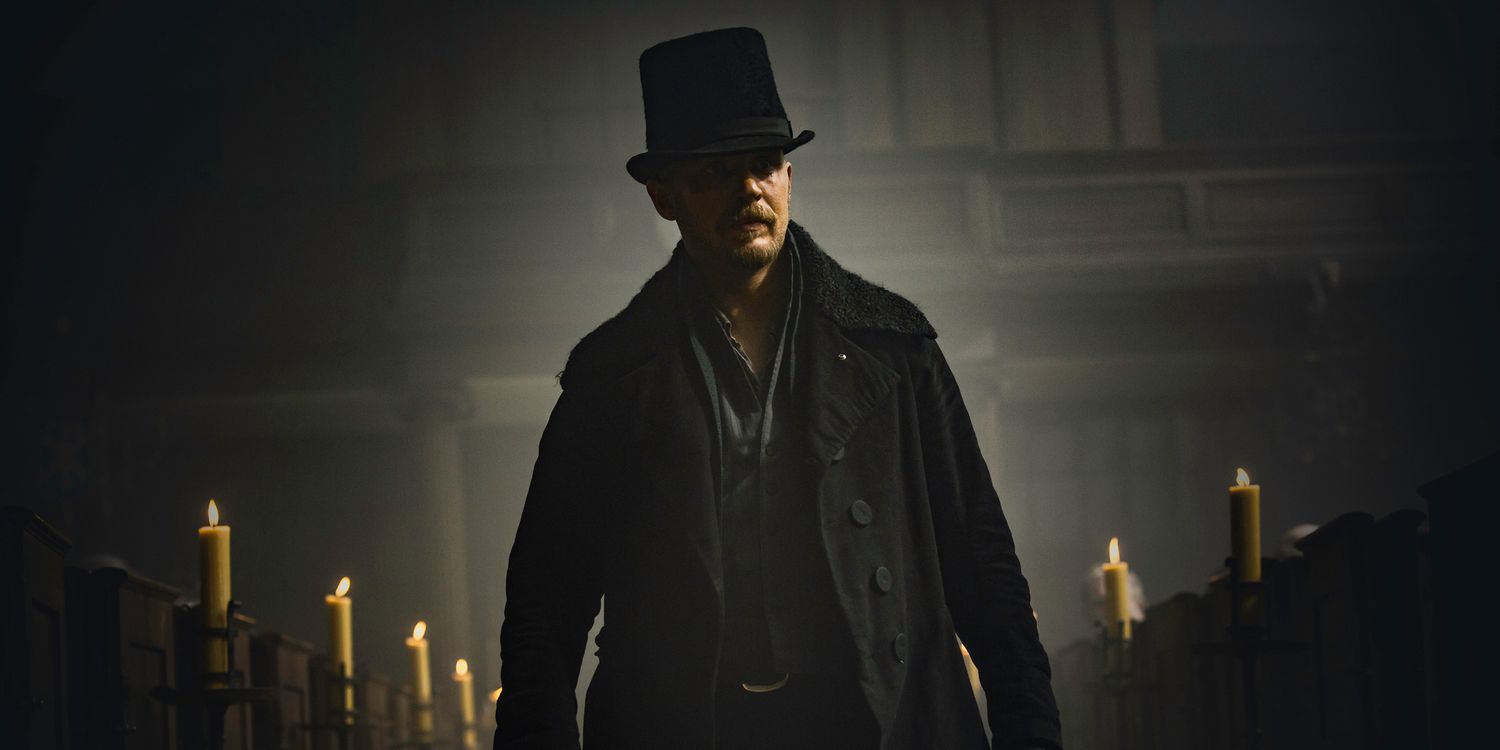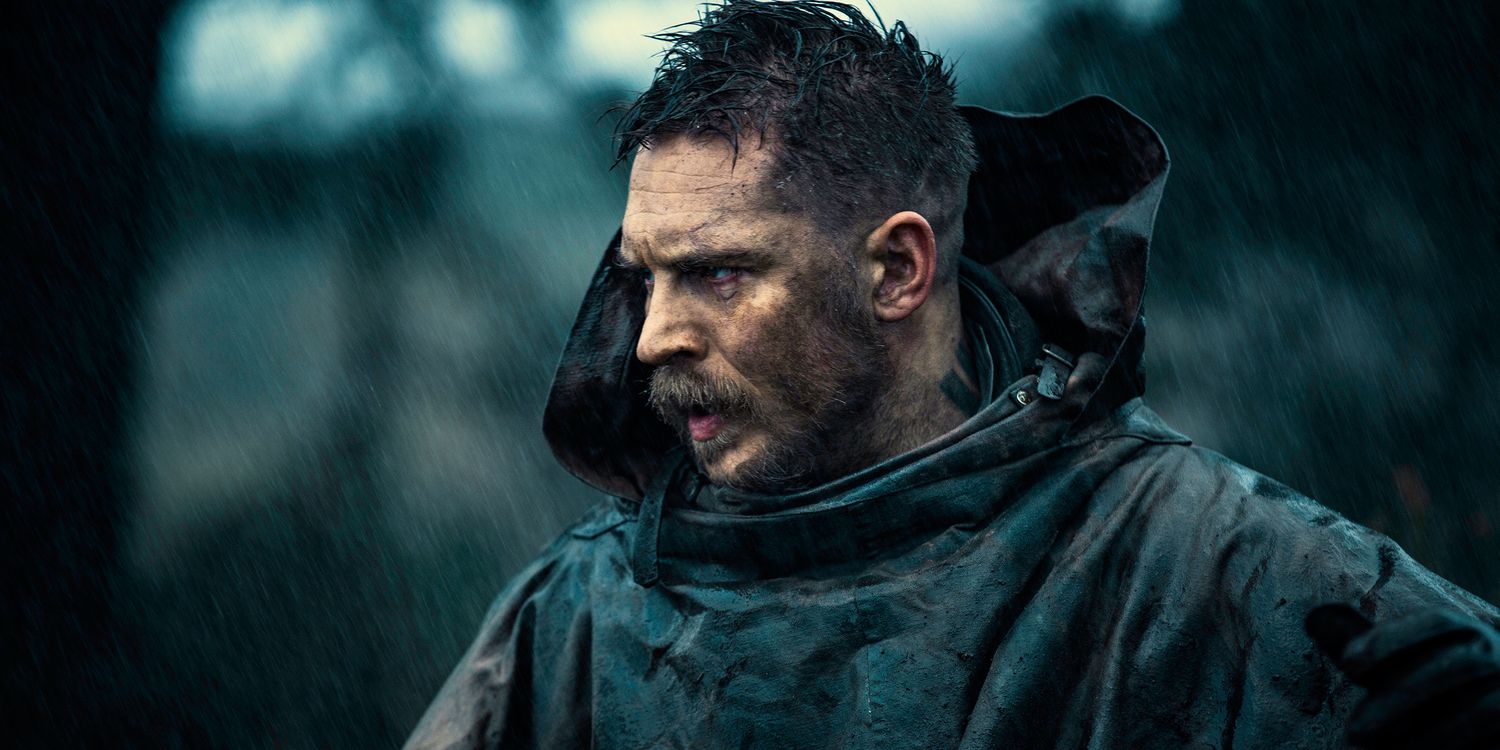Tom Hardy created Taboo along with his father Chips and (Peaky Blinders creator) Steven Knight, so it's no surprise that, in the early going, the series mostly lives and dies on his presence alone. It's a good thing, then, that Hardy has the kind of captivating aura to keep most audiences engaged, as the dark period drama certainly makes use of its serialized format, becoming another drop in the ocean of Peak TV walking the fine line of being a television series and (in this case) an eight-hour movie. The show is slow to build intrigue, but rest assured, like Hardy's revenge-minded James Keziah Delaney appearing unexpectedly at his father's funeral, intrigue presents itself in bewildering ways. In the premiere, however, it is mostly confined to the way Hardy stalks the streets of London some two centuries ago, cloaked in a long black coat and top hat, brooding and invading the personal space of nearly everyone he comes in contact with as a means of instigating trouble as a former insider turned outcast.
A revenge narrative mixed with hints of the prodigal son parable thrown in for good measure (though this time the second brother is a half-sister played by Oona Chaplin, last seen for many American audiences rethinking the RSVP she sent to a certain wedding), Taboo makes its introduction through a visually striking first episode, one that knows the appeal of fine detail in selling a story such as this. That effort continues through the first three episodes sent out to critics by FX, as though Knight and director Kristoffer Nyholm (who splits directorial duties with Anders Engström) were most concerned with establishing a solid sense of time and place, and then reiterating that in an effort to concretize certain aspects of the story.
Those aspects are primarily concerned with underlining a disparity in quality of life amongst those living in early 19th century London. It is a world of muddy streets beneath a soot-filled sky, and the pervading sense that there's not a dry spot on land to be found. It is the sort of appreciable attention to detail that helps sell everyone's performance and gives the series an appropriately miserable lived-in quality. Taboo establishes its anti-romanticism of the period early on, juxtaposing squalor and hardship against the inimitable power of the East India Company and the excess of the Prince Regent (Mark Gatiss). That dichotomy helps emphasize some of the core elements of Delaney's plan, as he seems destined to have returned not only to right personal wrongs relating to questions about his father's death, but also to slap away the hands of the EIC, headed by Jonathan Pryce in full Charles Dance in Tywin Lannister mode, as it scoops everything into its gaping maw.
Knight's scripting, and certainly the input from both Hardys, is clearly intended to have Delaney be more than just personal vendetta in a natty top hat. He's representative of the unsung and disadvantaged, noted by the unflattering reputation of having committed evil deeds that, as the series progresses, are nonetheless presumed to be the product of having participated in the genocidal atrocities committed in the name of empire-building, manifest destiny, and capitalism. But such participation has left Delaney in the grip of madness of a sort. He is plagued with visions of past deeds, a sinking slave ship and its shackled occupants, as well as his mother, a native of Nootka Sound, the strategic stretch of land (to both the British and Americans) off Canda's west coast that Delaney is the sole inheritor of. Through it all, there is more than one suggestion that over the course of his travels Delaney has had a transcendental experience, and returned home a changed man – perhaps no longer a man even, but a figure representative of something else entirely.
What changes have taken place and what they ultimately mean are allowed to simmer for as long as possible. It's a secret that Taboo is reluctant to reveal too soon, instead hoping Delaney's plotting and scheming will suffice until the moment for the truth to be revealed presents itself. In that regard, the miniseries takes on a Peaky Blinders-esque quality of being equally enamored with the steps antiheroes take in achieving their goals, especially when those goals throw a wrench in the works of powerful institutions. And like Knight's other scoundrel-obsessed period drama, Taboo has questions about its protagonist, despite positioning him as being almost always right due to the nature of his chosen adversaries. In this case, the series intimates a rather… taboo relationship between James and his half-sister Zilpha. Further complicating matters is Zilpha's scheming husband Thorne Geary (Jefferson Hall) who sees Delaney as competition – for the ownership of Nootka Sound and not the affections of his wife, however.
It all adds up to a dark, slow-moving but nonetheless intriguing drama with secrets to dispense in due time. It's likely that those drawn to Hardy's onscreen intensity and seemingly unlimited capacity to become the physical embodiment of gloomy menace will be the ones most likely to stick around until the very end, and in doing so will reap the potential rewards of, if nothing else, answers to the questions of Delaney's past misdeeds and experiences in Africa. But until those answers are more forthcoming, viewers must choose how entertained by Taboo's extravagant attention to period detail and unusual revenge-focused narrative they will be.
-
Taboo continues next Tuesday @10pm on FX.
Photos: FX


